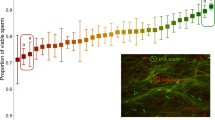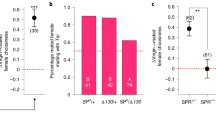Abstract
EACH sex is part of the environment of the other sex. This may lead to perpetual coevolution between the sexes, when adaptation by one sex reduces fitness of the other. Indirect evidence comes from experiments with Drosophila melanogaster indicating that seminal fluid reduces the competitive ability of sperm from other males, thereby increasing male fitness1,2. It also reduces a female's propensity to remate and increases her egg-laying rate3. In contrast to these benefits to males, seminal fluid has substantial toxic side effects in females, with increasing quantity leading to decreasing female survival4,5. Here I show that when female D. melanogaster are experimentally prevented from coevolving with males, males rapidly adapt to the static female phenotype. This male adaptation leads to a reduction in female survivorship, which is mediated by an increased rate of remating and increased toxicity of seminal fluid.
This is a preview of subscription content, access via your institution
Access options
Subscribe to this journal
Receive 51 print issues and online access
$199.00 per year
only $3.90 per issue
Buy this article
- Purchase on Springer Link
- Instant access to full article PDF
Prices may be subject to local taxes which are calculated during checkout
Similar content being viewed by others
References
Clarke, A. G., Aguade, M., Prout, T., Harshman, L. G. & Langley, C. H. Genetics 139, 189–201 (1995).
Harshman, L. G. & Prout, T. Evolution 48, 758–766 (1994).
Chen, P. et al. Cell 54, 291–298 (1988).
Fowler, K. & Partridge, L. Nature 338, 760–761 (1989).
Chapman, T., Liddle, L. F., Kalb, M. J., Wolfner, M. F. & Partridge, L. Nature 373, 241–244 (1995).
Charlesworth, B. Genet. Res. 63, 213–227 (1994).
Charlesworth, D., Morgan, M. T. & Charlesworth, B. Genet. Res. 61, 1289–1303 (1993).
Barton, N. Genetics 140, 821–841 (1995).
Manning, J. T. & Thompson, D. J. Acta biotheoret. 33, 219–225 (1984).
Peck, J. R. Genetics 137, 597–606 (1994).
Van Valen, L. Evol. Theory 1, 1–30 (1973).
Coyne, J. Nature 355, 511–515 (1992).
Wu, C. -l. & Palopoli, M. F. A. Rev. Genet. 27, 283–308 (1994).
Orr, H. A. Genetics 139, 1805–1813 (1995).
Muller, H. J. Biol. Symp. 6, 71–125 (1942).
Rice, W. R. & Hostert, E. H. Evolution 47, 1637–1653 (1993).
Rice, W. R. & Gaines, S. D. Trends Ecol. Evol. 9, 235–237 (1994).
Author information
Authors and Affiliations
Rights and permissions
About this article
Cite this article
Rice, W. Sexually antagonistic male adaptation triggered by experimental arrest of female evolution. Nature 381, 232–234 (1996). https://doi.org/10.1038/381232a0
Received:
Accepted:
Issue Date:
DOI: https://doi.org/10.1038/381232a0
This article is cited by
-
Investigating the interaction between inter-locus and intra-locus sexual conflict using hemiclonal analysis in Drosophila melanogaster
BMC Ecology and Evolution (2022)
-
Pollinating fig wasps’ simple solutions to complex sex ratio problems: a review
Frontiers in Zoology (2022)
-
Female-limited X chromosome evolution reveals that lifespan is mainly modulated by interlocus rather than intralocus sexual conflict
Behavioral Ecology and Sociobiology (2022)
-
Evolution of reduced mate harming tendency of males in Drosophila melanogaster populations selected for faster life history
Behavioral Ecology and Sociobiology (2022)
-
Sex differences in spiders: from phenotype to genomics
Development Genes and Evolution (2020)
Comments
By submitting a comment you agree to abide by our Terms and Community Guidelines. If you find something abusive or that does not comply with our terms or guidelines please flag it as inappropriate.



